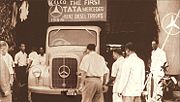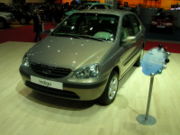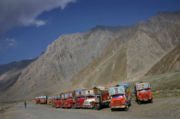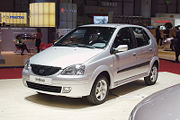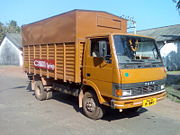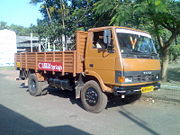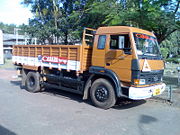Tata Motors
2008/9 Schools Wikipedia Selection. Related subjects: Road transport
| Tata Motors Limited टाटा मोटर्स |
|
|---|---|
| Image:Tata logo1.gif | |
| Type | Public ( NYSE: TTM) |
| Founded | 1945 |
| Headquarters | Mumbai, India |
| Key people | Ratan Tata, Chairman |
| Industry | Automotive |
| Products | Automobiles and Engines |
| Revenue | INR 369.88 billion (US$ 9.07 billion) (2006) |
| Subsidiaries | Tata Daewoo Commercial Vehicle |
| Website | Tatamotors |
Tata Motors Limited (Hindi: टाटा मोटर्स), formerly known as TELCO (TATA Engineering and Locomotive Company), ( NYSE: TTM) - is India's largest passenger automobile and commercial vehicle manufacturing company. It is a part of the Tata Group, and has its headquarters in Mumbai, Maharashtra. One of the world's largest manufacturers of commercial vehicles and known for its hatchback passenger vehicle Tata Indica, Tata Motors has its manufacturing base in Jamshedpur, Lucknow, Pune and Singur. The OICA ranked it as the world's 21st largest vehicle manufacturer, based on figures for 2006.
Tata Motors was established in 1945, when the company began making trains. Tata Motors was first listed on the NYSE in 2004. Tata Motors had created the wealth Rs. 320 billion during 2001-2006 and stood among top 10 wealth creators in India. In 2004 it also bought Daewoo's truck manufacturing unit, now known as Tata Daewoo Commercial Vehicle, in South Korea. In March 2005, it acquired a 21% stake in Hispano Carrocera SA, giving it controlling rights in the company. On 10 January 2008, Tata Motors launched their much awaited Tata Nano, noted for its Rs 100,000 price-tag, at Auto Expo 2008 in Pragati Maidan, Delhi.
Background
Tata Motors is a company of the Tata and Sons Group, founded by Jamshetji Tata. It is currently headed by Ratan Tata.
The company has the workforce of 22000 employees working in its three plants and other regional and zonal offices across the country.
Tata Motors' range of passenger cars is still not comprehensive by international standards. In commercial vehicles, Tata Motors commands an imposing 65% market share in the domestic heavy commercial market. The company is trying to modernise its range of commercial vehicles. Tata Motors hived off its vehicle finance business into a separate subsidiary, TML Financial Services (TMLFS), in September 2006.
Time line and milestones
1960-1986
Tata Motors is the 2nd largest commercial vehicle maker in India. World over it is the world's fifth largest medium and heavy commercial vehicle manufacturer. It started its journey in 1960 with the manufacturing of first commercial vehicle (a copy of a Daimler Benz model) in Pune. It took five years for the company to begin the commercial production of heavy commercial Vehicles. Considering the road infrastructure of the country which does not support heavy vehicles the company adopted a route for light commercial vehicles (LCV). It came out with its first LCV, Tata 407, in 1986.
1987-1996
Tatamobile introduced in 1989. Post liberalization, in order to expand rapidly, the company adopted the route to joint ventures. In 1993 it signed with Cummins Engine Co., Inc., for the manufacture of high horsepower and emission friendly diesel engines. It was an effort made to reduce the pollution in the existing Tata engines and to produce more environmentally friendly engines. Furthering the trail of JVs it signed a joint venture agreement with Tata Holset Ltd., UK, for manufacturing turbochargers to be used on Cummins engines.
1997-2006
In 2000, it launched compressed natural gas (CNG) buses and also filled the product line gap through the introduction of the 1109 vehicle which is an intermediate commercial vehicle and is useful for medium tonnage loads. Post 2000, the company introduced a variety of new models. It introduced the Ex- series vehicles with high tonnage capacity and high pick up and also came out with the entirely new LCV (207 DI) with direct ignition technology to cater to the customers' requiring one and same vehicle for commercial as well as personal use.
Daewoo acquisition
In 2004, it acquired the Daewoo Commercial Vehicle Company of South Korea. The reasons behind the acquisition were:
- Company’s global plans to reduce domestic exposure The domestic commercial vehicle market is highly cyclical in nature and prone to fluctuations in the domestic economy. Tata Motors has a high domestic exposure of ~94% in the MHCV segment and ~84% in the light commercial vehicle (LCV) segment. Since the domestic commercial vehicle sales of the company are at the mercy of the structural economic factors, it is increasingly looking at the international markets. The company plans to diversify into various markets across the world in both MHCV as well as LCV segments.
- To expand the product portfolio Tata Motors recently introduced the 25MT GVW Tata Novus from Daewoo’s (South Korea) (TDCV) platform. Tata plans to leverage on the strong presence of TDCV in the heavy-tonnage range and introduce products in India at an appropriate time. This was mainly to cater to the international market and also to cater to the domestic market where a major improvement in the Road infrastructure was done through the National Highway Development Project
On its journey to make an international foot print, it continued its expansion through the introduction of new products into the market range of buses (Starbus & Globus).
Joint ventures
In 2005, sensing the huge opportunity in the fully built bus segment, Tata Motors acquired 21% stake in Hispano Carrocera SA , Spanish bus manufacturing company and introduced its high-end inter-city buses in the country.
Tata Motors has also formed a 51:49 joint venture with Marcopolo S.A., a Brazil-based global leader in bus body building. This joint venture is to manufacture and assemble fully-built buses and coaches targeted at developing mass rapid transportation systems. The joint venture will absorb technology and expertise in chassis and aggregates from Tata Motors, and Marcopolo will provide know-how in processes and systems for bodybuilding and bus body design.
A venture with British carmaker MG Rover saw the launch of the CityRover in 2003. This car was based on the Tata Indica and built alongside it in India, but sales were not strong and production finished in April 2005 when MG Rover went bankrupt. MG Rover was purchased by Nanjing Automobile of China three months later, but when car production resumed in 2007, the CityRover was not part of the production plans.
Tata Ace
The latest hit of Tata Motors is its mini truck Ace. Ace, India's first indigenously developed sub-one ton mini-truck, was launched in May 2005. It was an instant hit. Analysts opined that Ace had changed the dynamics of the light commercial vehicle (LCV) market in India by creating a new market segment termed the SCV segment. Ace rapidly emerged as the first choice for transporters and single truck owners for city and rural transport. By October 2005, since the launch of Ace, LCV sales of Tata Motors had grown by 36.6 percent to 28,537 units due to the rising demand for Ace.
In 2005, Tata Motors became the only major engine manufacturer in the world (aside from a Briggs & Stratton emissions test) to express any formal interest in the turbulence-boosting cylinder head grooves invented by Somender Singh ( Mysore).
2007
Tata Motors, through its joint venture with Fiat, gained access to Fiat’s diesel engine technology and is likely to gain access to the latter’s strong overseas distribution network for its passenger cars. Tata Motors is looking to extend this relationship to other segments like pick-ups and MHCVs. The company also plans to expand its global footprint with the launch of ‘Global Truck’ and ‘Global Pick-up’ in domestic and international markets by 2007-08. Tata Motors plans to launch the new pick-up in India, Southeast Asia, Europe, South Africa, Turkey and Saudi Arabia. The launch of the global truck will mark the entry of the company into developed markets like Europe and the United States. The project was initially a collaboration between Tata Motors and its subsidiary Tata Daewoo Commercial Vehicles, but later Tata Motors decided to work with Iveco as Daewoo’s design was not in sync with the needs of sophisticated European customers. The company has formed a joint venture with Thailand’s Thonburi,( Exhibit-1) an independent auto assembler, in which Tata Motors will hold a 70% stake. The joint venture will set up a plant with capacity to manufacture pick-ups a year and will sell them in Thailand, the second largest pick-up market in the world, and in other regional markets. The joint venture product is likely to be a part of Tata Motors’ ‘Global pick-up’ plans.
2008 onwards
On January 3rd, 2008, The Hindu Business Line reported that Ford Motor Company (US) named Tata Motors the "preferred bidder for Ford's British marquees Jaguar and Land Rover ... but a final decision for the sale was yet to be taken".
Compressed air car is going to be produced by Tata Motors in 2008.
Auto policy of Government of India (GOI) envisions to establish a globally competitive automotive industry in India and to double its contribution to the economy by 2010. GOI policy has rightly recognized the need for modernizing of vehicles to arrest degradation of air quality. The terminal life policy for commercial vehicles and move toward international taxing policies linked to age of vehicles, are steps in the right direction which will lead to increased sales for Tata motors Commercial vehicle division.
Effect of Government Policy on Tata Motors CV Division Commercial Vehicles segment sector has been at the forefront of the strong showing by the automotive industry over the past few years. Following factors have led to growth in sales:
- The cut in excise duty that enabled manufacturers like Tata Motors to reduce prices
- The attractive financing offers and freebies enabled by low interest rate policies by Government
- the need to transport higher volumes of agricultural and industrial goods
- Low interest rates
New auto policy considered by Government of India last announced an automobile policy in December 1997. The policy required majority-owned subsidiaries of foreign car firms to invest at least $50 million in equity if they wished to set up manufacturing projects in India. It also forced them to take on export obligations to fund their auto part imports and required them to submit to a schedule for increasing the share of locally made parts in their cars. Mere car assembling operations were not welcomed.
An Indian cabinet panel will soon consider a new automobile policy that aims to set fresh investment guidelines for foreign firms wishing to manufacture vehicles in the country. Investments in making auto parts by a foreign vehicle maker will also be considered a part of the minimum foreign investment made by it in an auto-making subsidiary in India. The move is aimed at helping India emerge as a hub for global manufacturing and sourcing for auto parts. The policy sets an export target of $1 billion by 2005 and $2.7 billion by 2010. The policies adopted by Government will increase competition in domestic market, motivate many foreign commercial vehicle manufactures to set up shops in India, whom will make India as a production hub and export to nearest market. Thus Tata Motors CV will have to face tough competition in near future, which might affect its growth negatively.
Chrysler collaborates with Tata: Tata's all-electric Ace mini truck will be sold through Chrysler's Global Electric Motorcars division.
Tata Nano
Tata has developed a car, named Tata Nano, that aims to sell in 2008. It is the least expensive production car in the world: the price is about Rs 100 000 (USD $2,500). The company unveiled the supermini car during the Auto Expo 2008 exhibition in Pragati Maidan, New Delhi. Tata Nano is considered to be the cheapest production car in the world. Bajaj Auto and Mahindra- Renault have plans to launch cars in this price range.
Tata has faced controversy over developing the Nano. Some environmentalists are concerned that the launch of such a low-price car could lead to mass motorization in India with adverse effects on pollution and global warming. And there was strong opposition to the compulsory acquisition of land for the proposed car factory in Singur.
Global competition
Tata Motors have some distinct advantages in comparison to other MNC competitors. There is definite cost advantage as labor cost is 8-9 percent of sales as against 30-35 percent of sales in developed economies. Tata motors have extensive backward and forward linkages and it is strongly interwoven with machine tools and metals sectors. India is an excellent source for IT based engineering solution for products & process Integration. There are strong supporting industries i.e. auto component industry has world class capabilities. There is huge demand in domestic markets due to infrastructure developments and Tata Motors is able to leverage its knowledge of Indian market. There are favorable Government polices and regulations to boost the auto industry i.e. Incentive for R&D.
Global presence
In 2004, Tata Motors bought Daewoo's truck manufacturing unit, now known as Tata Daewoo Commercial Vehicle, in South Korea. In March 2005, it acquired a 21% stake in Hispano Carrocera SA, giving it controlling rights in the company.
On January 3, 2008 Ford Motor Co. picked India's Tata Motors Ltd. as the top bidder for its Jaguar Cars and Land Rover units and has now entered more "focused negotiations at a more detailed level" with Tata.
Present global challenge
Volvo, a manufacturer of trucks, buses, cars, construction equipment, and aero engines, has entered in India in 1998. Its main focus is in the area of fully built buses. In India, it has focused on providing economical transport solutions in consonance with its values of safety, quality, and environmental care. Its competitive advantage is its high technology which makes the vehicle a very comfortable option to travel through. Its trucks are reputed for their performance and economy and are the flag bearers in their production activities in India. It is still operating in the niche market of high end buses where the Tata compete through its Spanish buses.
Future challenges
Plastic Car Production- Tata plans on producing a car that is made of nearly 100% plastic.
- Mahindra and Mahindra: JV with ITEC, North American leader in heavy trucks. M&M has formed a 51:49 JV called Mahindra International with ITEC, USA, (parent NAVISTAR), to manufacture commercial vehicles and to bolster its position in the CV business. ITEC is the leader in medium and heavy trucks and buses in North America, and is the world's largest manufacturer of medium-duty diesel engines. Mahindra International aims to have a presence across the CV market (6-35 tonnes GVW) with variants of passenger transport, cargo and specialised load applications and is likely to start producing medium/heavy commercial vehicles from FY09.
- Force Motors: JV with MAN for manufacturing high-tonnage vehicles Force Motors has paired up with MAN in a 70:30 JV to manufacture high-tonnage and specialty vehicles, such as long-haul trucks, tippers, tractor trailers and multi-axle vehicles in the 16-32 tonne range at its Pithampur plant, with an initial capacity of 24,000 units per annum and at an investment of Rs7bn. The JV plans to sell nearly half of its production in the domestic market, while the rest is to be exported to the Middle East, Turkey, Russia, Asia and Africa. Further, the two companies have formed another JV to manufacture buses in India from end-2007.
- Ashok Leyland: Acquisition of Czech Republic-based Avia Ashok Leyland (ALL) recently acquired the truck unit of Czech Republic-based Avia for US$35m. Avia manufactures 6-9 tonne LCVs and has a capacity of 20,000 units per annum. The acquisition has given ALL direct access to an entire range of Avia trucks, Avia’s press shop with dies and tools, welding lines, state-of-the-art paint shop and R&D facilities. ALL has also entered into technology agreements with Hino Motors of Japan and ZF of Germany to complement its in-house R&D efforts and developing complementary components and aggregates.
Products
Passenger cars and utility vehicles
- Tata Sierra
- Tata Estate
- Tata Sumo/Spacio
- Tata Safari
- Tata Indica
- Tata Indigo
- Tata Indigo Marina
- Tata Nano (September 2008)
- Tata Xenon XT
Concept vehicles
- 2000 Aria Roadster
- 2001 Aria Coupe
- 2002 Tata Indica
- 2004 Tata Indigo Advent
- 2005 Tata Xover
- 2006 Tata Cliffrider
- 2007 Tata Elegante
Commercial vehicles
- Tata Ace
- Tata TL/Telcoline/207 DI Pickup Truck
- Tata 407 Ex and Ex2
- Tata 709 Ex
- Tata 809 Ex and Ex2
- Tata 909 Ex and Ex2
- Tata 1109 (Intermediate truck)
- Tata 1510/1512 (Medium bus)
- Tata 1610/1616 (Heavy bus)
- Tata 1613/1615 (Medium truck)
- Tata 2515/2516 (Medium truck)
- Tata 3015 (Heavy truck)
- Tata 3516 (Heavy truck)
- Tata Novus (Heavy truck designed by Tata Daewoo)
Military vehicles
- Tata 407 Troop Carrier, available in hard top, soft top, 4x4, and 4x2 versions
- Tata LPTA 713 TC (4x4)
- Tata LPT 709 E
- Tata SD 1015 TC (4x4)
- Tata LPTA 1615 TC (4x4)
- Tata LPTA 1621 TC (6x6)
- Tata LPTA 1615 TC (4x2)
Alternative propulsion
Tata Motors aims at producing around 6,000 OneCAT air cars at €2,500 by 2008.
Tata Motors subsidiaries
- Telco Construction Equipment is a joint venture between Tata Motors and Hitachi, which focuses on excavators and other construction equipment.
HV Transmission (HVTL) and HV Axles (HVAL): HVAL and HVTL are 100% subsidiary companies of Tata Motors engaged in the business of manufacture of gear boxes and axles for heavy and medium commercial vehicles, with production facilities and infrastructure based at Jamshedpur. The combined revenue of the two companies rose 38.7% yoy for 9MFY07 while the combined PAT rose 50.9%. Tata Motors plans a capex of Rs2bn each for HVAL & HVTL and plans to raise funds for the same, most probably by way of a strategic sale to a technical collaborator. The strategic sale of either HVAL or HVTL or both is likely to be completed in the next one or two quarters.
Tata Technologies Limited (TTL): TTL provides Engineering and Design (E&D) solutions to the Automotive Industry. Tata Motors holds 86.91% of TTL’s share capital. TTL is based in Pune (Hinjawadi) and operates in the US and Europe through its wholly owned subsidiaries in Detroit and London respectively. It also has a presence in Thailand. Tata Technologies is a software service provider in the IT services and BPO space. Its global client list includes Ford, General Motors, Toyota and Honda, to name a few. It bought over the British engineering and design services company, Incat International Plc for Rs4b in August 2005. Incat specializes in engineering & design services and product lifecycle management in the international automotive, aerospace and engineering markets. With this acquisition, Tata Motors will have closer proximity to its global customers and be able to provide a wider range of services.
Tata Daewoo CV Ltd(TDCV): TDCV is a 100% subsidiary of the Tata Motors based in South Korea, which was acquired in March 2004. TDCV is in the business of manufacture and sale of heavy commercial vehicles.Tata Daewoo is Tata Motors’ 100% subsidiary in Korea, with a market share of 30%.Tata Motors will use the Daewoo technology to introduce higher tonnage trucks in the Indian market and use Tata Daewoo for exports globally. In line with this strategy, it has already introduced the Novus, a high-end tipper developed by Tata Daewoo for the Indian market.
Forbes Global 2000 Ranking - 2005
The Forbes Global 2000 list for the year 2005 ranked Tata Motors at 1215.
